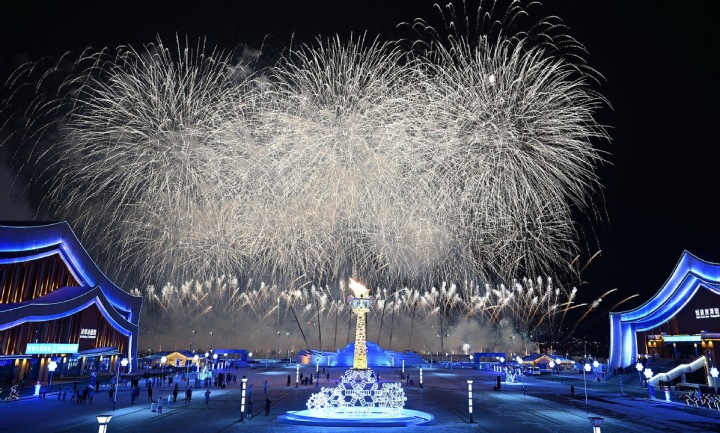
China's 14th National Winter Games, featuring over 3,700 athletes from across the nation, officially open in Hulunbuir, North China's Inner Mongolia autonomous region, on Feb 17. LIAN ZHEN/XINHUA
HOHHOT — China's winter sports industry will receive a boost from the country's 14th National Winter Games, which opened in North China's Inner Mongolia autonomous region on Feb 17.
As the nation's first comprehensive winter sports event after the Beijing 2022 Winter Olympics, the games feature more than 3,700 athletes in 176 events across eight sports — the largest edition in the history of the National Winter Games.
Two years after the Beijing Winter Olympics, the ripple effects of its legacy have continued to grow, fueled by the National Winter Games. This has led to improved athletic achievements, a booming winter sports industry, and the public's growing enthusiasm for ice-and-snow sports and related tourism.
"The 14th National Winter Games will further consolidate the goal of engaging 300 million people in winter sports, a goal set when Beijing won the Olympic bid in 2015. It will also serve as a drill for our athletes to sharpen the competitive edge for the 2026 Winter Olympics," said Ding Tao, an official with the General Administration of Sport.
Dream come true
Historically, Chinese tourists have preferred to spend their winter holidays in warmer climes down south. However, this year's Spring Festival saw a rise in ice-and-snow tourism, especially in Hulunbuir, the host city of the 14th National Winter Games' ice sports events.
For the first time in her life, Zhang Ruiyang from Hebei province spent her Spring Festival holiday in Hulunbuir, which is several hundred kilometers from home.
Fourteen-year-old Zhang, a fan of star speed skater Lin Xiaojun, saw her winter dream come to life in Hulunbuir. Her parents had planned an immersive experience for her and her brother, scheduling to attend the short-track speed skating competitions, which started prior to the official opening of the games.
"I've practiced short-track speed skating for a year and a half, and I really adore Lin Xiaojun. I'm very happy that my parents and my brother all accompanied me to achieve my wish of watching Lin's races on site," said Zhang.
Winter usually spans seven months in Hulunbuir, with temperatures plummeting well below-20 C, and the season is usually not an ideal time for tourism. This year, however, some scenic spots were operated for the first time in winter.
Bat Suh, a 50-year-old local herdsman, has been involved in tourism for 12 years. He describes this winter as the busiest he has experienced. "The impact of the 14th Winter Games is very apparent. This winter, we have seen an increase in tourists, as well as many activities," he noted.
Apart from the booming winter tourism, winter sports events and activities have also spurred the construction of infrastructure, helping better promote such sports in China.
Moreover, the frenzy of winter sports has overcome the obstacles of climate and geography, reaching the cities and towns that seldom see snow all year round.
The sports gala has also inspired Inner Mongolia to make better use of its abundant ice-and-snow resources. "We plan to develop the ice-and-snow equipment manufacturing industry in the future. We'll cooperate with universities and research institutes to build test bases for ice and snow equipment in extremely cold regions. It can also help us transform and upgrade our industries," said Xuan Mingmei, head of the Ice and Snow Industry Research Institute of Hailaar district, Hulunbuir.
Rising powerhouse
The 14th National Winter Games feature events in line with the 2026 Milan-Cortina Winter Olympics.
Cross-country skier Wang Qiang earned a gold medal with a 17.1-second lead over the runner-up in the men's 7.5 km skiathlon event at the National Winter Games.
To prepare for the games, Wang, who twice broke China's record in the event, had been training in Norway since last September, and continually improved by competing with top athletes around the world.
His hard work paid off, as he grabbed three golds during national cross-country skiing events last year.
Two years ago, China notched up nine golds, four silvers and two bronze medals to rank third in Beijing 2022, with the number of gold and total medals marking record highs in its Olympic Winter Games history.
Figure skating and snowboarding have also attracted more and more youngsters, further enlarging China's talent pool. The Chinese Figure Skating Association has lowered the threshold of the national level test, making it possible for beginners to take the starting level test after three to six months of training.
Data showed that the number of national-level testers saw an increase of 77.94 percent in 2023 compared to 2021.
